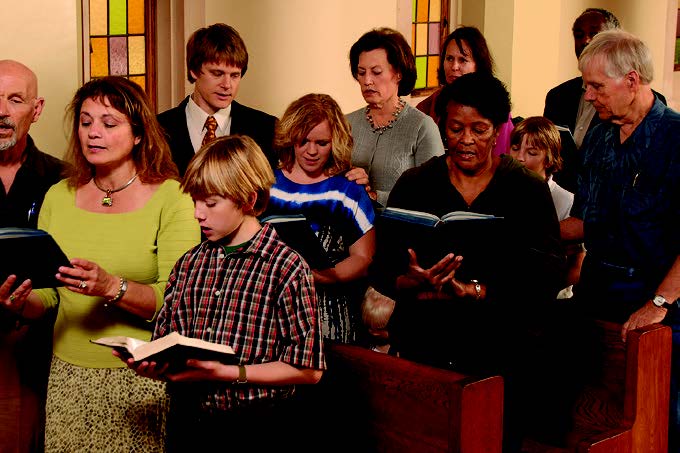Why do we sing together when we assemble as a congregation for Sabbath services? Singing together is not wallowing in emotionalism, pretending that it is true spirituality. It is not “downtime” while we take a break before a more important part of the program. No, it is a special part of our Sabbath worship, and is beneficial in a variety of ways. There are very good reasons why we sing together on the Sabbath.
Some Protestant congregations devote as much as one-third or even half of the Sunday service to congregational singing and musical performances. By comparison, the traditional five songs sung at each weekly Sabbath service in the Living Church of God are but a small part of our worship by comparison.
So, why do we take this valuable time to sing together as a congregation? And, when we do so, what makes our singing different from ordinary singing in other circumstances?
As Christians, we should consider how God instructs us to come before Him.
This article is meant to answer that question. We should understand the value and the benefits of singing together on the Sabbath. We should understand that song services are much more than a break between the “important” parts of the services.
First, notice how we are instructed to come before God. Psalm 100:1 “Make a joyful shout to the Lord, all you lands!” (Psalm 100:1). The Hebrew word used here for “shout” has the sense of “to split the ears”—to make a powerful sound.
The psalmist continues: “Serve the Lord with gladness [joy, mirth, pleasure]; come before His presence with singing” (v. 2).
This all sounds very uplifting. But why are we to do this? We know that God’s instructions are for our benefit. His way works for us. Somehow or other, we can be confident that singing together is good for us.
Aside from the spiritual application, you might be surprised to learn that scientists have determined that group singing can lower stress, relieve anxiety and improve our general wellbeing. Group singing releases endorphins—those elation-building hormones in our bodies that are associated with feelings of pleasure. Among its other benefits, group singing simply helps us feel better!
What other instructions does God give us about singing? He tells us how to sing. “Sing praises to God, sing praises! Sing praises to our King, sing praises! For God is the King of all the earth; sing praises with understanding” (Psalm 47:6–7). Notice that we are not just supposed to mouth the sounds of the song. We are to understand what we are singing. This means that we need to think about the words we sing.
Interestingly, research has found what we also know from common experience, that words accompanied by music tend to be “stickier”—more accurately retained—in our minds. They are easier for us to remember. Music enhances our ability to learn and recall the words of the songs we sing together.
And the benefits go deeper still. We all know that the Sabbath is a time for renewal—a time when we can recharge our physical, mental, emotional and spiritual “batteries.” So it should be no surprise that this commanded activity actually helps to rewire and rebuild the human brain! “Researchers have recently found that teaching stroke victims to sing rewires their brains and allows them to regain their speech. This process, called ‘melodic intonation therapy…’” (“Singing ‘rewires’ damaged brain,” BBC News, February 21, 2010).
Dr. Douglas Winnail has talked to participants at recent Regional Conference meetings, and emphasized that use of the Internet affects neural pathways in the brain, and in fact “conditions” the brain by how it is used. The more we use certain areas of our brain, the stronger the neural circuitry becomes; the less we use them, the weaker they become. Music and singing works similarly; it is a “brain conditioner” that brings about changes in the brain that are just as profound—or even more so—than what a surgeon might try to do by using a knife.
Yes, singing together can actually have a healing effect on the brain! In fact, it has a potentially unifying effect. Scientists know that the hormone oxytocin is released during group singing. That hormone enhances feelings of trust and bonding, and alleviates anxiety and stress.
Furthermore, researchers in Sweden monitored the heart rates of singers as they performed a variety of choral works. Their finding? “The pulse goes down when you exhale and when you inhale it goes up.” They found that as the members sang in unison, their pulses began to speed up and slow down at the same rate. This study suggests that choir singers not only harmonize their voices, they also synchronize their heartbeats. (“Choir singers ‘synchronise their heartbeats,’ BBC News, July 8, 2013).
So, what have we learned? Group singing has been scientifically proven to lower stress, relieve anxiety and improve well-being; it enhances feelings of trust, bonding and unity and it rewires the brain. Researchers have found that singing is like an infusion of the perfect natural tranquilizer, one that both soothes the nerves and elevates the spirit—and does so with no negative side effects. There is no downside.
But what if you feel that you are not a good singer? It turns out you do not even need to be a good singer to reap the rewards of singing. According to one 2005 study, group singing “can produce satisfying and therapeutic sensations even when the sound produced by the vocal instrument is of mediocre quality” (“Singing Changes Your Brain,” TIME.com, August 16, 2013).
Singing has long been a part of Christian worship. Thirty years after the death of Christ, the early New Testament Church continued the custom of singing. “Let the word of Christ dwell in you richly in all wisdom, teaching and admonishing one another in psalms and hymns and spiritual songs, singing with grace in your hearts to the Lord” (Colossians 3:16).
Remember, we are instructed to sing. “Make a joyful shout to the Lord, all you lands! Serve the Lord with gladness; come before His presence with singing” (Psalm 100:1–2).
So, sing out at Sabbath services. It is good for you—in many, many ways.